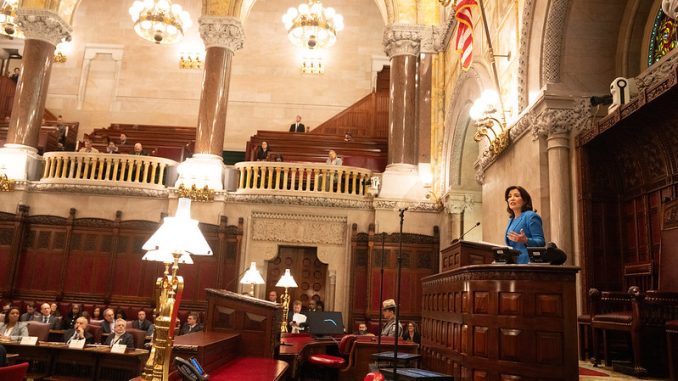
By John Zaher
Governor Hochul’s recent proposal that the Electoral College be replaced by the popular vote is not only wrong on its merits, but would also require a constitutional amendment and the support of 38 states, most of which benefit from the existence of the Electoral College.
Her proposal is a little more than political gamesmanship, but that’s to be expected. She, along with the Democrat-controlled state Legislature, attempted to trample on voters’ rights with the elimination of odd-year elections. Thankfully, common sense has prevailed for the time being when a judge in upstate New York declared the state’s Even Year Election Law unconstitutional.
In the Electoral College, candidates run for president in order to win the popular vote in each of the 50 states. Each state has a certain number of electoral votes and awards the winning candidates two Electoral College votes, along with the number of members of the House of Representatives it has been apportioned with. The District of Columbia is also apportioned three Electoral College votes. Currently, there are 538 electoral college votes at stake. A candidate needs 270 to secure the presidency.
Every state in the union employs a winner-take-all system where, if you win the state, you win the electoral votes; the only exceptions are Maine and Nebraska, both of which assign two electoral college votes to the state-wide popular vote winner and the remaining to the winner of each congressional district. In 2024, this resulted in Nebraska and Maine’s electoral college votes being split with President-elect Trump being awarded four out of five votes in Nebraska and Kamala Harris winning three out of four votes in Maine.
The Electoral College allows candidates to focus their energy and campaign funds on swing states, which certainly benefit from the attention and publicity, while states considered safe for that candidate are relatively ignored. However, without the Electoral College, campaigns would become national affairs, with candidates spending money to win every vote possible. That would result in pouring in every dollar into television advertising, social media advertising and direct mail on a nationwide basis to reach and persuade nearly 155 million voters.
There are other good reasons for the Electoral College. While some of our elections are close in the popular vote, the Electoral College allows the candidate to have a greater mandate. Even though Donald Trump won a plurality of the popular vote at 49.9% to 48.4%, he handily won the Electoral College, 312-226.
With voters so evenly divided and polarized in recent years, the Electoral College also helps us manage exceptionally close elections. Take, for example, the George Bush-Al Gore election in Florida in 2000. That resulted in a painstaking hand count, as well as a Supreme Court ruling that declared Bush the winner.
If you could imagine a close popular vote, it could affect every county in the nation, resulting in a widespread recount to make sure that “every vote counts.” It would not only be lengthy, but also prompt litigation and a constitutional crisis if a clear-cut winner cannot be declared. In 2000, the focus was on only one state — Florida — rather than all 50 states.
One reform this author had advocated is for more states to adopt the Maine and Nebraska models. You don’t need to get a constitutional amendment to adopt it, as it is up to the individual states to determine the manner of selecting electors. This would increase voter engagement and participation, have candidates focus their energies on swing districts throughout the country, often more suburban and rural areas — which candidates basically ignore — instead of just the large cities and result in more competitive races. There would still be a focus on swing states at-large to win their two Electoral College votes.
The Electoral College is often a popular scapegoat, but it has served us well and helps to bring greater stability to a divided nation.

